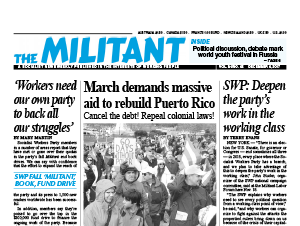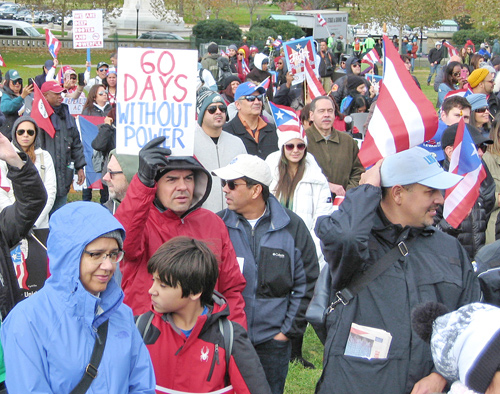“Even before Hurricane Maria we were suffering from a humanitarian crisis,” Evelyn Mejil, central organizer of the Unity March for Puerto Rico, told the crowd. She was referring to high unemployment, low wages, cuts in social services and health care, and deteriorating infrastructure across the island. “Hurricane Maria just exposed what [the U.S. government] has been doing with Puerto Rico. It made the world a witness to the injustice that Puerto Rico has been suffering because of legislation that has been crippling our nation.”
“We are not demanding handouts,” Mejil added. “We’re asking them to eliminate the Jones Act, that they cancel the debt,” and that they provide the funds necessary to rebuild the country.
The Jones Act, which requires that maritime cargo between Puerto Rico and the United States be carried on U.S.-owned vessels, increases shipping costs and the price of basic necessities and everything else.
Other speakers, including Congressman Luis Gutiérrez and well-known actor and playwright Lin-Manuel Miranda, noted that the U.S. government and the Federal Emergency Management Agency had provided faster, more efficient aid to victims of the recent hurricanes in Florida and Texas, than they have to Puerto Rico.
Participants in the demonstration came from across the Eastern Seaboard and as far away as Chicago; Lorain, Ohio; and Florida. Many said it was the first time they ever joined a protest.
Angelita Berríos, 56, a truck driver from Philadelphia, told the Militant that two months after Puerto Rico was devastated by Hurricane Maria most of her family there is still without electricity. “We’re a colony and we’re part of the United States,” she said. “We’ve been forced to fight in their wars and pay the taxes they impose on us. But now that we need aid, it’s not enough and it’s too slow.”
More than half of Puerto Rico’s residents are still without electricity, a fifth have no running water, thousands of homes are without roofs and large parts of the island have no phone service. Even those with running water are told to boil it first to avoid getting sick.
Lt. Gen. Jeffrey Buchanan, who headed up work in Puerto Rico by the U.S. National Guard and Army, clearing many roads, restoring electricity and distributing some food and water, announced Nov. 17 that Washington is winding down this operation.
‘Should be treated as human beings’
Sol Nadal, 22, from Bayamón, Puerto Rico, was visiting relatives in the U.S. when she heard about the demonstration. “We have no electricity, except for what we get from our own generator,” said Nadal, a student at the University of Puerto Rico. “The gasoline to run the generator just eight hours a day costs $600 a month. It doesn’t matter if we are U.S. citizens or not. We should be treated as human beings.”In mid-November Puerto Rican officials admitted that although the official death toll is 55, in September this year 472 more people died than in that month last year. Deaths as a result of lack of refrigeration for insulin, cutbacks in dialysis because of electricity shortages, closed hospitals and doctors offices, contaminated water, and lack of air conditioning for people who were already ill when the storm hit are not included in the official figures.
Even before the hurricanes hit, so many people have been leaving — some 1,200 every week — that more Puerto Ricans live in the U.S. than in Puerto Rico. The New York Times reported Nov. 17 that at least 168,000 people have fled the island in the last two months, most heading
to Florida.
Prior to the storms, the U.S.-imposed Financial Oversight and Management Board — set up to tighten Washington’s control of Puerto Rico’s government finances to maximize payment on the debt to bondholders — had ordered the Puerto Rican government to make steep cuts in the pensions and the workweek of public employees and to the budget of the University of Puerto Rico. Bondholders continue to press for payment of the debt.
Participants in the march had a variety of views on what to do about Puerto Rico’s
colonial status.
“We need something new,” said Maria Franco, who moved from Santa Isabel, Puerto Rico, to New Haven, Connecticut, after the hurricane. “I don’t like Commonwealth, what we are right now. With statehood, we would have a clear designation with the USA.”
“I want the whole system to change, for independence,” said Milly Guzman-Young, who helped organize participation from Hartford, Connecticut, in the march. “Look at what happened in the last 100 years in the hands of the U.S. — debt, laws against our economy.”
Anger is growing on the island over the continuing social crisis. Residents of the Puerto Nuevo neighborhood in San Juan marched Nov. 19 to protest the lack of electricity in their community and health centers.
Jacob Perasso in Albany, New York, contributed to this article.
|
Printer-friendly version of this article |








 click here for information and literature from the Socialist Workers Party 2016 campaign
click here for information and literature from the Socialist Workers Party 2016 campaign a magazine of Marxist politics and theory from 1934 to the present
a magazine of Marxist politics and theory from 1934 to the present an international news magazine published from 1963 to 1986
an international news magazine published from 1963 to 1986 a socialist magazine in Spanish published from 1977 to 2005
a socialist magazine in Spanish published from 1977 to 2005




